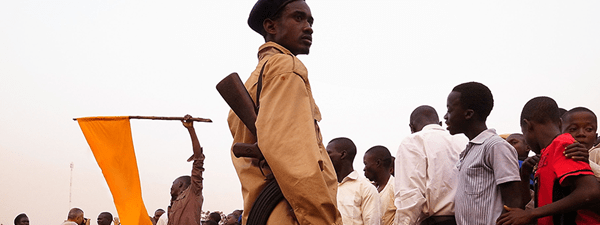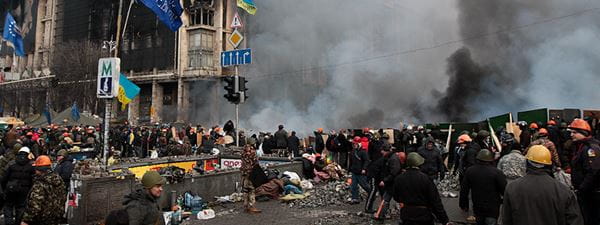Crisis South Sudan and Ukraine
Published: September 2014
IN THE FACE OF A CRISIS: TRAVEL SECURITY SERVICES IN SOUTH SUDAN AND UKRAINE
On the surface, South Sudan and Ukraine have little in common: one a newly-formed and developing African nation, the other a developed ‘strategic country’ located at the crossroads of Russia and Europe. In late 2013 however, both countries erupted in violence simultaneously after months of simmering political tension, leading to rapidly deteriorating security situations that required swift and decisive interventions from International SOS and Control Risks. In each case, operational requirements and responses were on a scale not seen since the Arab Spring of 2011.

With clients operating in both countries, crisis management teams and medical, security and logistics providers were mobilised to deliver vital assistance. From the provision of timely strategic guidance to the coordination of air evacuations, the actions of International SOS’ and Control Risks’ joint venture helped to ensure that clients remained safe as the dual crises unfolded.
South Sudan is the world’s youngest nation. Gaining independence in 2011, the country comprises regions that have been riven by political and tribal hostilities for decades. Tensions have often led to violence, although incidents have generally remained localised and without any major escalations. On 15 December 2013 an exchange of gunfire between rival units of the presidential guard in the country’s capital, Juba, suddenly spiralled out of control. Accusations of an attempted coup led to a rapid intensification of fighting, and within days the violence had spread to other parts of the country. Land borders with neighbouring Uganda and Kenya were closed and the only accredited medical provider in Juba was shut down. The closure and reopening of the country’s international airport also led to transport chaos and overwhelming demand for outbound flights.
Monitoring the situation closely, International SOS and Control Risks raised the country evacuation level to ‘STAND BY’ as requests for assistance began flooding in. “We received confirmation of the violence and the first client calls on 16 December,” says Heimo Grasser, Coordinating Security Manager, Middle East and North East Africa (MENEA) for International SOS and Control Risks. “It was clear this was far more than a routine outbreak of hostilities, and by 17 December our Dubai Regional Crisis Management Team had been activated. From our assistance centre in Dubai we liaised with London, Paris, Frankfurt and other international assistance centres to coordinate regional and global resources in anticipation of mass evacuations.”
As the security situation deteriorated, International SOS and Control Risks raised the evacuation level to ‘EVACUATE: NON-ESSENTIAL STAFF’. “The priority,” explains Grasser, “was to evacuate people from Juba and get them to international safe havens in Uganda, Kenya and South Africa. This involved organising chartered flights, commercial flights and transportation to the airport. We also had to relocate people internally from remote rural areas to the capital.”
While the evacuations got underway, International SOS and partner Control Risks sent regular information updates to clients via online and mobile channels. “It was critical that we could deliver reliable information,” says Glen Ransom, Regional Security Analyst for International SOS and Control Risks. “We called upon our accredited on-the-ground provider to help verify intelligence and provide a clear situational picture for our clients. It’s this kind of partnership work that really sets us apart in these situations.”
In the days that followed, the crisis management team delivered 32 security updates, purchased hundreds of mobile airtime minutes for clients in remote locations, and evacuated 237 people from 25 organisations to international safe zones.
“We knew South Sudan was a volatile place”, says Grasser, “but the combination of our country intelligence and quick mobilisation of network resources enabled us to protect people on the ground.”
ESCALATION IN UKRAINE
As South Sudan dissolved into political violence, another security situation was unfolding in Ukraine. The second largest country in Eastern Europe, Ukraine is a nation of major ‘geostrategic significance’, with access to the Black Sea via the Crimea and land borders with Russia, Hungary, Poland and Slovakia, among other countries.
In November 2013, Ukraine’s then President Victor Yanukovych, announced his decision to abandon a trade agreement with the European Union. This move sparked mass street protests that would eventually lead to Yanukovych’s downfall and the annexation of Crimea by Russia. Throughout late 2013 and early 2014, events moved quickly and unrest spread as clashes between opposition activists, Government troops and pro-Russian forces intensified. In late February, Kiev saw its worst day of violence in 70 years, with at least 88 people killed.

“Ukraine was previously a low-risk, stable destination,” says Robert Walker, Head of Information and Analysis at International SOS and Control Risks. “There had been longstanding client interest in the country, good infrastructure and no real issues for international travellers. But then, after the Kiev protests, all that changed.”
With growing uncertainty around Russia’s intentions and ongoing violence across the country, clients operating in Ukraine became increasingly concerned for the wellbeing of their employees.
“Our response involved working closely with Control Risks and utilising their providers on the ground,” says Walker. “In this way we were able to deliver expert logistical and security support. We monitored the road and air routes out of the country and provided a continual flow of intelligence to ensure clients got the assistance and advice they required.”

Through the collaboration of International SOS Assistance Centres in Dubai, London, Moscow and Frankfurt, the crisis management team was able to help and advise 107 companies between February and March, delivering 104 situational reports, including six special advisories to support critical management decisions.
SITUATIONAL PREPAREDNESS
While the events in both South Sudan and Ukraine happened quickly, International SOS and Control Risks were able to respond swiftly and effectively due to its unique in-country knowledge, resources and preparedness.
“The quality of our response in these situations is built on months if not years of background work and analysis,” says Walker. “Our knowledge of the history and politics of each country, and the network relationships we build, enable us to understand potential scenarios and to spell out the consequences of certain actions. We’re able to look ahead and see how clients could prepare for situations as they unfold.”
Utilising its foresight and preparedness, International SOS and Control Risks were able to anticipate the rapid deterioration of events in Ukraine and South Sudan. In Ukraine especially, the two companies’ expertise in political risk analysis meant it was well positioned to respond.
“We’ve built strong strategic alliances with political and global analysts specialising in countries along Russia’s borders,” says Walker. “And via our mobile apps, emails and webinars for risk managers operating in the region, we’re able to deliver truly world-class guidance and support.”
CUTTING THROUGH THE NOISE
The clarity and neutrality of the information delivered during these crises was essential to the success of International SOS’ and Control Risks’ operations. In each case, the company used its provider network to cut through the noise and determine which sources of information were credible, as Glen Ransom concludes: “With our eyes and ears on the ground, we’re able to verify intelligence and provide contextual information that is not skewed by commercial media agendas. This means we can give accurate, proportionate and entirely neutral advice, the sole intention of which is to provide maximum value to our clients and keep their people safe.”










